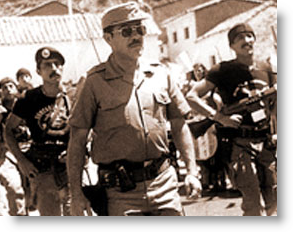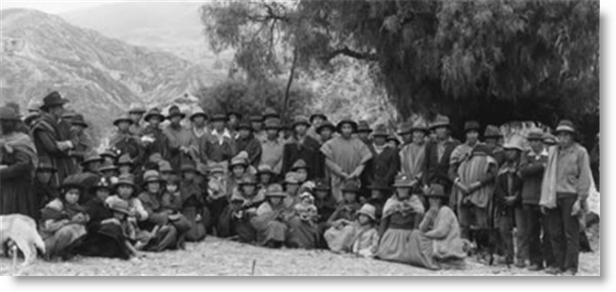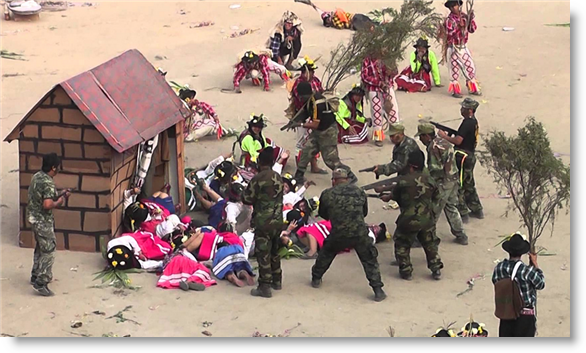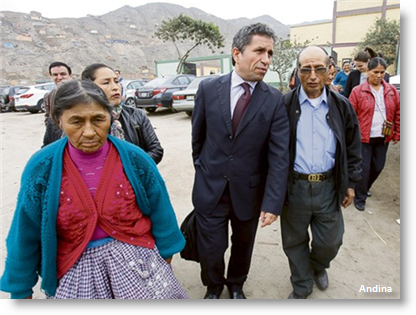
Criminal Prosecutor Luis Landa is to ask for a 25 year sentence next week for 29 army staff, including subalterns and eight commanding officers, for the murder of 69 villagers in Accomarca, Ayacucho.
The murder took place 30 years ago — in 1985 — at the height of the internal conflict with the Shining Path, when several patrols covered the Accomarca area and surrounding valleys in search of Shining Path rebels.
Landa’s presentation was to be made this past week but the Criminal Court postponed the session until July 15 because six of the accused did not appear in court to hear the charges. It is just one of the many stops and starts since the trial began in November 2010.
The townspeople of the Accomarca area have never given up, determined to seek justice for a crime that has affected them all deeply. Their experience has even been played out through choreography, a dance troupe going through the motions of chaos and murder.

Of the 29 military, the only officer in prison is Telmo Hurtado, who became known as the Butcher of the Andes and was extradited from the U.S. in 2011. All the other officers and soldiers are free.
On Aug. 14, 1985, three patrols moved into the Huancayoc valley. Lieut. Telmo Hurtado and his patrol rounded up the villagers, separating them into different houses — 12 men, 27 women and 30 children, including 20 children under the age of 10. All the women were raped. Then hand grenades were thrown into the houses, which were set on fire to ensure all of the villagers died.
Hurtado admits to killing 32 campesinos and alleges that another patrol officer, Lieut. Juan Rivera, killed another 12. The patrols then sought to kill any surviving witnesses — on Sept.13, they returned to kill another seven villagers, including a young boy.
Hurtado said he was obeying orders.

At the time, only weeks into Alan Garcia’s first presidential term, the Army put the blame squarely on Hurtado but the District Attorney determined shortly afterwards that the orders had come from the 2nd Infantry Division, under General Wilfredo Mori.
The Supreme Court, however, ruled that the case should be heard in a military court.
Hurtado was court martialled in February 1992 but was not given a sentence because he was only found guilty of disobeying orders, for allegedly not informing his superiors of the crime. He later applied to be included in the Amnesty Law enacted during Alberto Fujiori’s regime and his conviction was annulled. He continued in the army and retired with the rank of commander in 1999. Hurtado later emigrated to the U.S. from where he was extradited in 2011.
The Accomarca case opened in 2002, during the findings by the Truth and Reconciliation Commission’s investigations between 2001 and 2003. Investigations were taken up again in 2005, but the first hearings were only held in 2010 after the investigation process was completed.

Six high-ranking officers are accused of command responsibility, while Hurtado, Rivera and the solders in the patrol are accused of the actual crime.
A long list of witnesses have testified for the prosecution, including ex-president Alan Garcia, in April last year, who said that he had found out about the event through the newspapers and later ordered the firing of the president of the Joint Chiefs of Staff of the Armed Forces.
Hurtado’s defense is that he received direct orders, and that these events were usual in Ayacucho at the time —“that is how we combatted terrorism” —and that he was ordered to “clean the area”, i.e. eliminate any surviving witnesses of the crime
Next week, the team of lawyers arguing for the civil plaintiffs — the families of the victims— will present their allegations, led by Carlos Rivera, a former state prosecutor who now heads the Legal Defense Institute’s team. They are also demanding 25 years’ imprisonment, as well as civil reparation of $14 million.
Six more court sessions are scheduled, and the magistrate’s ruling is expected possibly in August.





